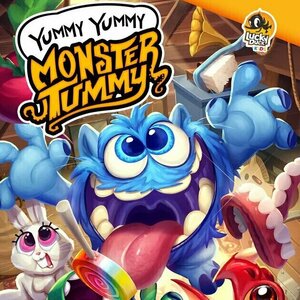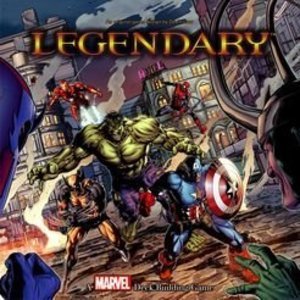
GPSRecorder Free
Navigation and Lifestyle
App
The “GPS Recorder Free” is a recorder capable of operating in all kinds of measuring...
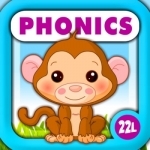
Phonics Island • Letter Sounds
Education and Games
App
***** Parents‘ Choice Awards winner ***** Developed by an award-winning education studios,...

GPS Recorder X
Navigation and Lifestyle
App
The “GPS Recorder X” is a recorder capable of operating in all kinds of measuring environments...

Phonics Island, Letter Sounds games & Alphabet Learning: Preschool Kids Reading
Education and Games
App
***** Parents‘ Choice Awards’ winner ***** Developed by an award-winning education studios,...
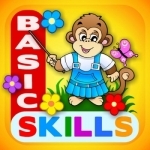
Preschool! & Toddler kids learning Abby Games free
Education and Games
App
***** Parents‘ Choice Awards’ winner ***** Developed by an award-winning education studios,...
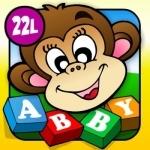
First Words 7+2 · Early Reading A to Z, TechMe Letter Recognition and Spelling (Animals, Colors, Numbers, Shapes, Fruits) - Learning Alphabet Activity Game with Letters for Kids (Toddler, Preschool, Kindergarten and 1st Grade) by Abby Monkey®
Education and Games
App
67 % OFF SALE - TODAY: August 19-31, 2017 ***** Developed by an award-winning education studio,...

LINE WORKS
Business and Productivity
App
You’re all set to start working once you install LINE WORKS on iPhone and iPad. Quick feedback...
Purple Phoenix Games (2266 KP) rated Yummy Yummy Monster Tummy in Tabletop Games
Jan 14, 2022
In Yummy Yummy Monster Tummy (which, again, I think I will just call “this game” from here on out), players are kids who are visiting their grandfather and hear noises in the attic. When the kids check out the noises, they find colorful little friendly monsters roaming about! These monsters are all super hungry, and you have found that they love eating items that are the same color as their fur. Oh, but they hate anything considered to be a “vitamin.” Sound familiar, parents?
DISCLAIMER: We were provided a copy of this game for the purposes of this review. This is a retail copy of the game, so what you see in these photos is exactly what would be received in your box. I do not intend to cover every single rule included in the rulebook, but will describe the overall game flow and major rule set so that our readers may get a sense of how the game plays. For more in depth rules, you may purchase a copy online or from your FLGS. -T
To setup this game, first download the official app to your phone or tablet. Yes, an app. Start the app and choose your skill level. Grab all the cards belonging to the Attic set, shuffle them, deal each player the appropriate amount of cards, and place the rest of the deck face-down to form a draw pile. You are now ready to play!
This game is a cooperative game, so players are all trying to win as a team. The whole object of the game is to play cards that will match the monster’s fur that shows up on the app. The color of the cards are very important, as the cards that are played (scanned by the app) will be mixed together to form the new color. So if the monster on screen is red, adding a blue and brown card just won’t do. This not only helps teach colors and mixing, but also encourages cooperation and concentration – something my kids definitely benefit from having in a game.
As the game progresses, other creatures are added that require players to scan other cards, or that give special abilities. I will leave those to you to discover through your plays; I do not wish to spoil much of anything.
Shown below is a screenshot from one of our games, so that you can see what most of the game looks like and how cute the little monsters are.
Players will continue to play cards, draw new cards, and try their hands at mixing the correct colors to match the monster as closely as they can until the app is finished throwing monsters at you. At that time, your success is evaluated and you may even progress to the next mission, or to a new area altogether, adding a new set of cards to the existing deck. This increases possibilities for new color combinations, but also slowly adds in new rules to keep the game interesting and fresh.
My little boy and I have played this game about three million times since we received it from Lucky Duck Games. We cannot get enough of it, and have tried to introduce other players to it with tons of success. The overall premise is very cute and easy to grasp. Even when adding in new creatures and their special rules, he has been handling it remarkably.
I really appreciate the effort that has gone into developing a hybrid app/board game for kids that is just really fun for all who play it. I have seen where this has been redeveloped and rethemed from a different game with more sensitive subject matter. So that’s a boon.
I think the hardest part about playing this game is finding the sweet spot of where to hold the card so that the front-facing camera on the device is able to scan the QR code on the card backs. I know my kid had a difficult time figuring out what “5-10 inches away from the camera” actually meant. An easy fix, and we were on our way to our hundredth play.
If you haven’t had the opportunity to play one of these app-drive hybrid games, I definitely recommend picking up a copy of Yummy Yummy Monster Tummy right away. It is very light, designed for children AND adults, and will provide innumerable hours of quality time with family.
Oh, and don’t worry about reading the rulebook. Just download the app, shuffle the cards, and let the app whisk you away… to your grampa’s attic. Enjoy!
Purple Phoenix Games (2266 KP) rated Legendary: A Marvel Deck Building Game in Tabletop Games
Sep 19, 2019
In an era where superheroes are the norm, the days of petty crime are over. As the protectors of our world have grown in power, so too have those who would see it fall to chaos. Out of the shadows comes a nefarious Mastermind who has engineered the most wicked evil scheme the world has ever seen. With an ever-growing band of followers and henchmen to carry out the plot, the future looks dismal. But do not fear – the supers are here! This job is way too big for only one single hero to handle, but if they all band together, then maybe, juuuust maybe, they might be able to pull it off…
DISCLAIMER: There are several expansions to this game, but we are not reviewing them at this time. Should we review them in the future we will either update this review or post a link to the new material here. -T
Set in the world of Marvel comics and, recently, the Marvel Cinematic Universe, Legendary: Marvel is a cooperative deck building game. Players take turns drafting and playing cards to recruit heroes to their team and to fight off the villains trying to carry out the sinister scheme. You have to strategize how you want to build your deck to best complete the mission – do you recruit heroes that give you special abilities (like drawing additional cards), or do you recruit strong heroes that give you lots of attack points? The choice is entirely up to you! Although all players are building their own individual decks, you must also devise a team strategy because all players either win or lose together as a team. That being said, there is a small competitive aspect to this game – the player with the most Victory Points (earned by defeating villains and rescuing bystanders) is deemed the most legendary hero of the game! Exactly how competitive the game gets is up to the players. I personally prefer a more cooperative approach and usually don’t tally up VPs at the end of the game – either the team won or we lost.
The beauty of this game is that it can be played with any combination of Marvel characters – you are not limited to only using specific teams. Selecting which heroes/villains/Mastermind/etc. to use is at the discretion of the players. Want Iron Man to team up with Deadpool and Wolverine to fight off Kingpin? Go for it! You have basically the entire Marvel universe from which to choose, so the sky is the limit! With so many options, though, it can be a little overwhelming, so I usually use a randomizer app to create a setup for me. Sometimes the setup itself will determine how the entire game will play out – certain combinations of Mastermind/villains/scheme can be BRUTAL to play and difficult to win. But the cool thing about this game is that you cannot just look at a setup and tell if it will be difficult or not – that realization only will come once you start playing!
I love playing this game because of its immense variability – the base game alone has 500 cards! The ability to choose your own heroes, villains, Masterminds, and Schemes means that you will probably never play the same game twice. And on top of that, Legendary: Marvel currently has like 19 expansions! The possibilities are truly endless, and that is the Holy Grail for me when it comes to gaming. I know that I will never get bored of this game because it is a different experience every game.
On the flip side, my main grievance with Legendary: Marvel is with the physical setup and teardown. Every play uses SO MANY cards that it does take a decent amount of time to get setup or put away. Every individual hero/villain/Mastermind/etc. must be sorted and stored separately, and with 500+ cards, that time adds up. When deciding on a game to play, sometimes I skip Legendary: Marvel because of the time it takes to set up. I LOVE to play it, but sometimes I do not feel like taking that much time to set up – I just want to play! My other grievance deals with certain hero superpowers/special card text. Some hero cards have special text, and the definitions are outlined in the rule book but not on the cards themselves. Until I learned/memorized what that special text meant, I was constantly referring back to the rule book nearly every turn to make sure I was using the cards correctly. There is a bit of a learning curve with some of the hero text, but it does get better the more you play!
Don’t let the simplicity of the mechanics fool you – this game requires more strategy than meets the eye! You must not only decide on a strategy for building your individual deck, but you and your teammates must also collectively choose a group strategy to defeat the Mastermind. Cooperation is key, and it really helps the theme of the game come to life. Definitely a winner for Purple Phoenix Games with a butt-kicking 24 / 24 and a well-earned Golden Feather Award!
Purple Phoenix Games (2266 KP) rated The Lost Expedition in Tabletop Games
Jul 22, 2021
Disclaimer: The Lost Expedition can be played cooperatively, solo, or head-to-head. This review only covers the cooperative version of the game! -L
The Lost Expedition is a cooperative (in this case) game of strategy and hand management in which players are trying to traverse the jungle to reach El Dorado by carefully managing their Resources and utilizing their collective Expertise. To setup the game, choose 3 explorers to form your team, and collect 3 Ammunition and 4 Food from the supply tokens. Shuffle the adventure cards, dealing 4 to every player, placing the remainder in a face-down draw deck. Depending on the difficulty selected, place the corresponding number of Expedition cards in a row on the table (we played Normal mode, using 9 Expedition cards). Place 4 Health tokens on each explorer card, place the phase token with the Morning side up, select a starting expedition leader, and the game is ready to begin.
Each round consists of 2 phases: Morning and Evening. During the Morning phase, players will take turns playing adventure cards from their hand, one at a time, until each player has played 2 cards. This line of cards forms the path that the explorers are traveling in the morning. After all cards have been played, they will be rearranged in numerical order, from lowest to highest. Once the cards are organized, they will be resolved one at a time, from lowest to highest, until all cards have been addressed. Examples of card actions are: discarding the next card in play, swapping two cards on the path, adding a new card to the end of the path, or moving the team pawn one card closer to El Dorado. Adventure cards have different colored boxes that indicate action choices that the players must make. Some actions are mandatory and must be completed. Some cards offer 2 or more choices, one of which must be selected and performed to clear the card. And some cards have optional choices, that do not have to be completed for the card to be resolved. Certain actions will require the team to gain/spend Resources tokens or Expertise from your explorers (in the form of Health tokens). At the end of the Morning phase, the team loses 1 Food token, and play continues to the Evening phase.
During the Evening phase, the gameplay is like that of the Morning with a couple of changes. Players again will alternate playing cards, but will play until all remaining cards in their hand have been played. Cards in the Evening phase are resolved in the order that they are played, and are not organized numerically like in the Morning phase. Again, after all cards are played, they will be resolved one by one as normal, paying Resources/Expertise as required. Once the Evening phase is finished, the team loses 1 Food token, players draw a new hand of cards, select another expedition leader, and a new round begins with the Morning phase. Play continues in this fashion until either the players have reached El Dorado, all 3 of the team’s explorers have died (have no remaining Health tokens), or if the adventure card draw deck runs out 2 times during play.
Pretty straight-forward, right? Play cards, resolve cards, repeat. That is one thing I really like about The Lost Expedition – it is simple, yet so strategic. Ultimately this is a game of Resource/Expertise management. You need at least 1 explorer to make it to El Dorado alive. There is no reward without risk in this game. Couple that with the multiple action options on each card, and you’ve really got to have a strategy. Maybe you’re low on Ammunition, but in order to gain back some much-needed Health, you’ve got to spend Ammo. Or are you willing to deal damage to an explorer if it means the team can advance a card? There are so many things to consider, and so many ways in which you can strategize, and that keeps all players engaged.
That being said, players are not allowed to reveal the details of any cards in hand. So how can you best communicate with your team about what types of cards to play if you can’t tell them point-blank? That added aspect of working in a team creates some unique strategies in and of itself. Ultimately, the final decision comes down to the expedition leader for the round – but what if they choose the action you didn’t want? How can everyone help balance everyone else out? You really have to work together to be successful. The flip-side of that teamwork is that the game can be frustrating in some aspects. You never truly know what your teammates are going to play at any given time, and the card they choose could totally unravel your plan. Not being able to discuss the specifics of cards in your hand makes sense (because then why wouldn’t the team just have one collective hand of cards?), but it adds an element of randomness and luck to the game that seems counterintuitive to me. Playing the wrong card at the wrong time might just turn your team against you, and that undermines the spirit of the game.
Let’s touch briefly on components. The cards are nice, oversized, and sturdy. The artwork is colorful and thematically appropriate. All of the Resources tokens are thick cardboard, and the meeples are nice and chunky. All in all, good production quality overall.
So how do I really feel about The Lost Expedition? I think it’s ok. It is strategic and entertaining, with the added elements of teamwork and cooperation – you either win together or lose together. As a group, you’ve got to have an adaptable strategy and manage your resources as best you can. Is it a game that I love? No. But it’s one that will probably stay in my collection for a bit, before it moves on to someone who might see some hidden quality that I may have missed. If you want a nice and relatively simple team game to play, maybe check out The Lost Expedition. And if risk/reward or resource management isn’t your jam, then maybe keep looking beyond this one. Purple Phoenix Games give The Lost Expedition an eventful 6 / 12.
